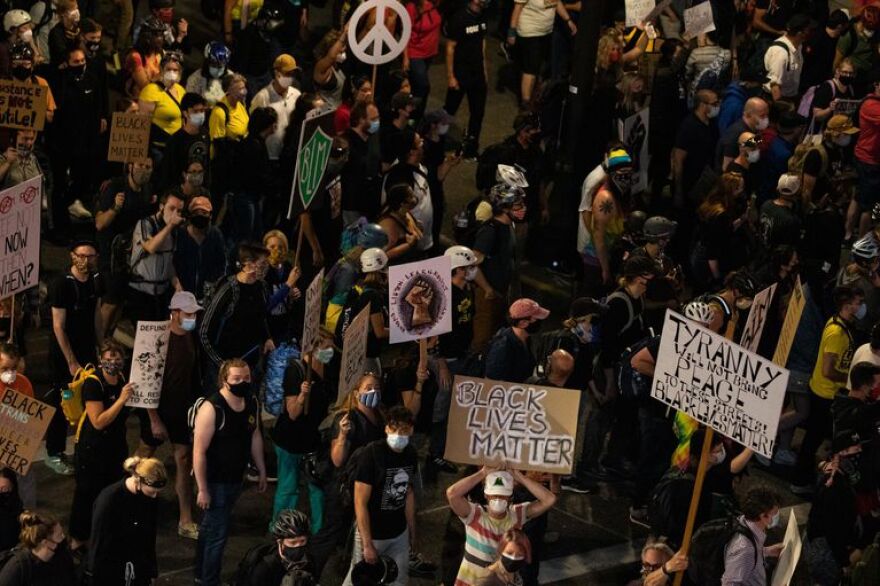Erik Neumann: There have now been 90 straight nights of protests. What was the original reason for the protest in Portland when they started in late May?
Sergio Olmos: When they started on May 28, a day before it became a large gathering in Portland, Danielle James and activist who's been out there said ‘We're going to occupy the Justice Center,’ which is where these events have large been taking place in downtown Portland ‘We're going to occupy the Justice Center until there's a charge and a conviction on the officers who killed George Floyd.’ Since then there has been charges against those officers and there's been more shootings and deaths at the hands of police of Black people in the United States. They're still chanting ‘Black Lives Matter’ and they're saying ‘George Floyd’ and ‘Breonna Taylor’ and last night they said ‘Jacob Blake,’ the man in Wisconsin who was shot by police. So, the main reasons are still Black Lives Matter, however, it's been three months and there's been more added to that conversation.
EN: Obviously, any time you have a huge group of people who are all coming out to protests, you'll have people who are there for lots of different reasons, so it's hard to lump everybody together. But as you've watched the events in the last three months, are the early goals of the protests in May the same as the goals now?
SO: I think so, because most of the chants you hear are ‘Black Lives Matter’ and I've covered lots of protests in Portland. I've covered the big ones with the Proud Boys versus antifa. At these Black Lives Matter protests, it has to be said that there is a lot of people of color at these. I think what gets lost in the quick 10 second clip on social media is you might see black bloc antifa and think that these are just the same as the other protests, and they’re really not. These protests are largely being led by black activists who go on the bullhorn and say ‘Here's where we're marching to,’ ‘Here’s what we're doing.’
EN: What about politics entering the protests as we get closer to the November election? The president has mentioned the protests in Portland quite a few times. There's now conservative counter-protests that are happening like this past weekend. Based on what you've seen, do you think the protest will become increasingly politicized as we get closer to the election?
SO: It looks that way. The last three months were Black Lives Matter protesters taking to the streets protesting against police. The dynamic was them and police kind of going back and forth. I think what we might see going forward is you can add a third actor to that. Just the same way we see it with the Black Lives Matter protesters were two large coalition, we're going to see that with the conservative side where you have kind of more suburban mom and dad types who say ‘Back the blue,’ ‘No property destruction,’ ‘Businesses are just trying to get back on their feet. Why are you doing this every night? It doesn't help.’ And then you have a kind of more hardcore, extreme or right-wing element like the Proud Boys. So, within that conservative side – who’s definitely now entered the arena – there’s also a wide range of opinions, and it doesn't seem right now like any of that is going away.
EN: Do you think there's something that could cause these protests to end peacefully at this point? Is there is there anything that would make either of the sides feel okay about stopping what they're doing?
SO: You know, it's unclear if it's a policy concession that would give them the victory to go home or if it's simply schools and everything opening back up again. The activists will tell you that it's not about ending the protest. They'll say ‘Don't worry about ending that. What you should be focusing on is the thesis of our argument, which is ‘Why are Black people continually [being] shot and treated much worse than their peers? They'll say that ‘We don't want to see any more people having to fight for the basic things that other people get handed to them, granted.’ They don't want to be denied jobs and they don't be denied mortgages and they don't want to find it just a little bit harder to do everything that everybody else seems to do, you know, quite normally.
This interview has been edited for length and clarity.



